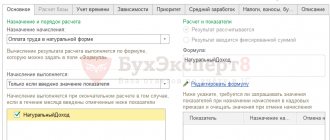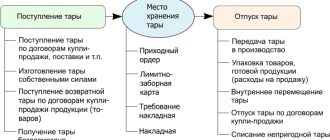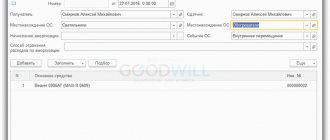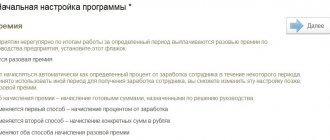Salary
Anastasia Sotskaya
Expert – HR, tax and accounting
Current as of January 19, 2021
Awarding a bonus to a director has its own characteristics. After all, the head of an organization is not an ordinary employee, but the sole executive body of a legal entity. Let's look at how to apply for a director's bonus in 2021.
Documentation of the bonus procedure
The conditions for bonus payments to the head of the organization must be provided for in the employment contract. When determining these conditions, the founders (participants, shareholders) must establish:
- indicators for which the manager is entitled to bonuses;
- types and amounts of bonuses and remuneration;
- sources of payment of bonuses;
- the procedure for making decisions on the payment of bonuses to the manager.
An example of how to reflect bonuses for the general director in an employment contract
A.V. was appointed General Director of Alpha LLC. Lviv. In addition to the official salary, the company's members approved indicators and bonus conditions for it. These indicators are reflected in the employment contract.
In addition, the conditions for paying bonuses to the director may be specified in the general Regulations on bonuses for employees of the organization, a collective agreement or other local act. Then it is not necessary to decipher them in the employment contract. It is enough to provide a link to the internal document (letters of the Ministry of Finance of Russia dated February 26, 2010 No. 03-03-06/1/92, dated February 5, 2008 No. 03-03-06/1/81).
Basic papers
Petition
A petition from a legal point of view means a request that is sent by government bodies that have the authority to consider and resolve it.
Important! The regulations for the preparation of documentation on the appointment of a bonus to a director must be approved by the local regulatory act of the company or regulated at the regional level.
The form of this document is free, but there are a number of rules that must be followed.
The application for a bonus must contain references to legislation or internal acts of the company that serve as the basis for issuing the reward. When drawing up an application, you must provide the following information:
- title of the document “Application for Bonus”;
- date of preparation of the document and its serial number;
- information about the director: full name, position title, name of the structural unit to which he is assigned;
- type of award;
- amount due and method of calculation of remuneration;
- reasons for bonuses;
- signature of the person who prepared the petition.
Position
When compiling this document, the following information is indicated:
- reasons for bonuses;
- payment terms;
- remuneration amounts.
The position serves to increase material interest in improving the quality of job duties, tasks and functions performed.
Solution
A director can be awarded a bonus only by decision of the organization's shareholders. A similar decision is made at the meeting and included in the minutes.
A decision is a document drawn up on company letterhead. The secretary records the following information in it:
- the total number of persons present, indicating the powers or incompetence of the meeting, the full name, position and passport details of the meeting chairman and secretary are also indicated;
- agenda: indicate the appointment of a bonus to the director;
- an indication of the amount of remuneration and the period for its receipt;
- signatures of the founders, the secretary of the meeting.
Reference! All minutes of the meeting are sent to an authorized person for storage.
Order
The order to assign remuneration is issued on the basis of a decision made by the shareholders. Then it is signed by the director himself. The order includes the following information:
- FULL NAME. and the position held by the person to whom the remuneration is due;
- The reason why the decision was made to award the employee a bonus;
- grounds for assigning remuneration;
- the amount and terms of payment of the bonus.
After drawing up the order, it is printed on the company’s letterhead. For convenience, the legislator suggests using form T-11. It was approved by the State Statistics Committee of the Russian Federation dated January 5, 2004 No. 1 “On approval of unified forms.”
Protocol
This document can be formatted in different ways:
- it can be signed by all members of the meeting;
- The presiding officer and the secretary can sign the protocol.
Each of the above methods must be enshrined in the local act of the company. When compiling a duct, the following data is used:
- type of general meeting;
- form of conduct;
- location;
- time spending;
- total number of participants with their full names;
- agenda;
- Names of the persons who heard and decided;
- signature of the chairman and secretary of the meeting.
Documentation of bonus accrual
Give one-time bonuses to the director:
- or on the basis of the minutes of the general meeting of participants (shareholders);
- or based on a decision of the board of directors or supervisory board;
- or based on the decision of the sole participant (shareholder who owns all voting shares) of the organization.
An example of how to draw up minutes of a general meeting of participants on the payment of a bonus to the general director
For the fulfillment of the established bonus indicators, the participants of Torgovaya LLC approved a quarterly bonus to General Director A.V. Lvov. This decision was documented in the minutes of the general meeting.
Attention: a hired director does not have the right to sign an order to accrue a one-time bonus to himself. This contradicts Part 2 of Article 135 and Article 191 of the Labor Code of the Russian Federation, which require that the decision on bonuses for an employee be made by the employer.
Payment of a bonus to a director on his own order may be considered inconsistent with labor legislation. In this case:
- the tax inspectorate can challenge the reduction of taxable profit by the amount of the premium (Article 255 of the Tax Code of the Russian Federation);
- founders (participants, shareholders) may demand from the director full compensation for damage caused to the organization (Article 277 of the Labor Code of the Russian Federation, Article 45 of the Law of February 8, 1998 No. 14-FZ and Article 71 of the Law of December 26, 1995 No. 208 -FZ);
- founders (participants, shareholders) can dismiss the director of the organization (clause 9, part 1, article 81 of the Labor Code of the Russian Federation).
Inspectors can detect this violation during an on-site or desk inspection, and the founders (participants, shareholders) can detect it from the organization’s reporting.
Situation: how to arrange a bonus payment to the general director if he is the only full-time employee of the organization?
The procedure for completing documents for payment of bonuses does not depend on the number of full-time employees. Therefore, in any case, award the bonus to the general director according to the decision of the founders (participants, shareholders) of the organization. The size of the bonus may depend on the degree of achievement of production targets or on the actual time worked. In this case, use financial statements, time sheets and other documents necessary to calculate the bonus.
Ways to encourage
One-time
This type of remuneration to a director can be assigned only on the basis of the minutes of the general meeting of shareholders of the company. One-time is a payment of a bonus that a director can receive in connection with certain events (completion of a project significant for the company, company anniversary, director’s birthday).
When all the documentation necessary to assign a bonus to a manager is ready, it is transferred to the accounting department for accrual. The appointment order specifies the timing of the transfer of remuneration to the director . If payment is untimely, then responsibility rests with the employee whose fault it was.
If there are no such deadlines, then the payment of a one-time remuneration is made together with the payment of wages. The bonus can be handed over to the director or transferred to his salary card.
The procedure for awarding bonuses to a director can be specified in the bonus regulations that apply in the organization, as well as in the director’s employment agreement. To pay, you need to draw up the minutes of the general meeting of shareholders and the decision of the sole founder, and then an order for bonuses is issued.
Permanent
A permanent bonus is awarded to the director on the basis of accounting and static reporting , as well as operational accounting data. A permanent bonus is issued by order, which indicates the name of the recipient, the type, size and grounds for payment of the remuneration. The bonus order is announced to the director against signature. This type of bonus is assigned based on the results of work for the reporting period.
Accounting
The procedure for reflecting bonuses to managers in accounting depends on the sources from which bonuses are paid:
- due to expenses for ordinary activities;
- at the expense of other expenses;
- due to net profit.
Write off the bonus accrued to the manager for meeting production targets as expenses for ordinary activities (clauses 5 and 8 of PBU 10/99). Reflect its accrual by posting:
Debit 26 (44) Credit 70
– a bonus was awarded to the director of the organization.
Non-production bonuses (for anniversaries, holidays, etc.) are classified as other expenses in accounting (clause 11 of PBU 10/99). Make the following entry in accounting:
Debit 91-2 Credit 70
– the bonus is accrued at the expense of other expenses.
If the source of payment of bonuses (both production and non-production) is retained (net) profit, make the following entry:
Debit 91-2 Credit 70
– the bonus is accrued at the expense of net profit.
Such an entry must be made regardless of whether the net profit of previous years or the current year is used to pay the bonus (including profit based on the results of the quarter, half a year, nine months). The fact is that such expenses cannot be reflected using account 84. These will be other expenses that also affect the financial result of the organization. Accordingly, such expenses must be reflected in the debit of account 91-2. Similar explanations are given in letters of the Ministry of Finance of Russia dated December 19, 2008 No. 07-05-06/260 and dated June 19, 2008 No. 07-05-06/138.
This order follows from the Instructions for the chart of accounts (accounts 26, 44, 70, 84, 91).
When is the bonus paid at the end of the year - terms
For annual bonuses, the law does not establish restrictions on the timing of payment. Obviously, payment is possible no earlier than the end of the period based on the results of which the bonus is paid, that is, the calendar year.
The employer determines the deadlines for paying bonuses at the end of the year independently, fixing them in the relevant local act. This may be a specific date, or a date before which the premium must be paid (for example, no later than April 1), or a month (for example, March), etc. It is also possible to indicate a specific event, for example, when a bonus is paid after the annual accounting statements are approved.
This approach does not contradict Art. 136 of the Labor Code of the Russian Federation, which requires wages to be paid at least every half month (no later than 15 days after the period for which it was accrued). Although the bonus is part of the salary, it is paid for a period longer than half a month, therefore the period for its payment (fixed by a local act) may be longer. This position was voiced by the Ministry of Labor in letter dated September 15, 2016 No. 14-1/10/B-6568.
Personal income tax and insurance premiums
Regardless of what taxation system the organization uses, calculate personal income tax on bonuses to the manager (clause 1 of Article 210 of the Tax Code of the Russian Federation). For the amount of premiums, add contributions to pension (social, medical) insurance and contributions to insurance against accidents and occupational diseases. This rule applies regardless of whether the bonus is provided for in the employment contract or not (part 1 of article 7, article 9 of the Law of July 24, 2009 No. 212-FZ and part 1 of article 20.1, article 20.2 of the Law of 24 July 1998 No. 125-FZ).
Income tax
When calculating income tax, take into account bonuses as part of labor costs if bonuses are paid for production indicators stipulated by the employment contract, and the source of their payment is not net profit (clause 2 of Article 255, clauses 1 and 21 of Article 270 of the Tax Code RF). Similar recommendations are given in letters of the Ministry of Finance of Russia dated November 30, 2009 No. 03-03-06/4/101, dated November 21, 2008 No. 03-03-06/4/85, Federal Tax Service of Russia dated August 20, 2014 No. SA-4-3/16606, dated May 20, 2010 No. ShS-37-3/1977. Despite the fact that these letters are addressed to state unitary enterprises, the conclusions of officials can also be applied by commercial organizations.
Executive bonuses are indirect expenses. Therefore, if an organization calculates income tax using the accrual method, these costs are fully attributed to the expenses of the current period (clause 2 of Article 318 of the Tax Code of the Russian Federation).
When using the cash method, take into account the costs upon payment of the premium (clause 3 of Article 273 of the Tax Code of the Russian Federation).
Bonuses and remunerations that are accrued to the director in excess of the amounts provided for in the employment contract cannot be taken into account for taxation (Clause 21, Article 270 of the Tax Code of the Russian Federation). Bonuses that are not related to the manager’s performance of his job duties (for example, bonuses for holidays, anniversaries) also do not reduce the tax base for income tax. Such payments do not meet the criterion of economic justification of costs (clause 1 of Article 252 of the Tax Code of the Russian Federation). A similar position is contained in the letter of the Ministry of Finance of Russia dated January 20, 2005 No. 03-05-02-04/5 and confirmed by arbitration practice (see, for example, the resolution of the Federal Antimonopoly Service of the Ural District dated January 11, 2006 No. F09-5989/05-S7 ).
For accounting for bonuses paid out of net profit, see How to register and record payment of bonuses out of net profit.
Employment contract
The founders, in addition to wages, can pay bonuses and rewards to the head of the organization. For this purpose, the employment contract provides for the conditions for his bonuses. Let's consider how to reflect in accounting a bonus accrued to the head of an organization.
When determining these conditions, the founders, as well as participants and shareholders, must establish: - bonus indicators; — types and amounts of bonuses and remuneration; — sources of payment of bonuses; — the procedure for making decisions on payment of bonuses. In addition, the conditions for paying bonuses may be provided for in the general Regulations on bonuses for employees of the organization, a collective agreement or other local act. In this case, it is not necessary to decipher them in the employment contract. The Ministry of Finance of the Russian Federation came to this conclusion in a letter dated February 26, 2010 N 03-03-06/1/92. It, in particular, states that bonuses to employees can be paid and taken into account as part of income tax expenses on the basis of the provision on bonuses to employees, provided that the employment contracts concluded with employees make reference to this provision. One-time bonuses to the heads of the organization can be awarded on the basis of one of the following documents: - minutes of the general meeting of participants (shareholders) of the company; — decisions of the board of directors or supervisory board; — decisions of the sole founder (participant, shareholder) of the organization. Here is a sample of an employment contract concluded with the director of an organization regarding his payment.
Samara December 12, 2015
1.1 This employment contract was concluded between the limited liability company "Aurora" (LLC "Aurora") represented by the sole founder Viktor Fedorovich Smirnov, on the one hand, and Alexey Vladimirovich Myasnikov, hereinafter referred to as General Director, on the other hand. <…>
5. Remuneration of the General Director.
5.1. The General Director is set a monthly salary of 120,000 (One hundred and twenty thousand) rubles. 5.2. The General Director is paid a quarterly bonus in the amount of 30% of the official salary, subject to an increase in the volume of balance sheet profit compared to the corresponding previous period. The degree of fulfillment of bonus indicators is determined according to the financial statements on an accrual basis from the beginning of the year. 5.3 The General Director is paid remuneration based on the results of work for the year. The source of remuneration is the profit remaining at the disposal of Aurora LLC after taxation. The size of the bonus depends on the length of service of the General Director in his position at Aurora LLC: - up to 2 years - in the amount of 15% of the official salary; - from 2 to 5 children - in the amount of 30% of the official salary; - over 5 years - in the amount of 50% of the official salary. Remuneration at the end of the year is paid if there is a free balance of profit, taking into account the actual time worked. 5.4. The decision on bonuses to the General Director and payment of remuneration to him at the end of the year is made by the sole founder. <…>
Here is a sample of the minutes of a meeting of the organization’s participants on the issue of bonuses for the general director.
Limited Liability Company "Papyrus"
(Papyrus LLC)
| Tver | April 25, 2021 |
Type of meeting: extraordinary Form of holding: joint presence (meeting). Venue of the general meeting: Tver, prosp. Stroiteley, 125 of. 45. Time of the general meeting: April 25, 2021, 10.00 Total number of participants: 2 (two) Present: 3 Present participants: Michurin Igor Makarovich - participant of Papyrus LLC; Swarovsky Konstantin Petrovich – participant of Papyrus LLC; Galina Petrovna Smirnova – chief accountant of Papyrus LLC Chairman of the meeting: Michurin I.M. Secretary of the meeting: Swarovsky K.P.
Agenda: Approval of the bonus based on the results of work for the first quarter of 2016 of Papyrus LLC to General Director A.V. Sevostyanov.
Listened to: Chief Accountant G.P. Smirnova on the fulfillment of indicators for bonuses to the general director of Papyrus LLC, A.V. Sevostyanov. for the first quarter of 2021
Resolved: 1. To approve A.V. Sevostyanov, General Director of Papyrus LLC. bonus for meeting bonus targets for the first quarter of 2021 in the amount of 25% of the official salary. 2. Chief accountant of Papyrus LLC G.P. Smirnova prepare the necessary documents and make the appropriate calculations. 3. The bonus must be paid no later than April 30, 2021 by transfer to the bank account of the general director.
Voted: “For” – 2; “Against” – 0; “Abstained” – 0
Decision is made.
Chairman of the meeting Michurin I.M. Michurin ───────── Secretary of the meeting Swarovsky K.P. Swarovskiy ──────────
When calculating bonuses to the head of an organization, it is worth remembering that the manager himself does not have the right to sign the accrual order. This contradicts the provisions of Art. 135 and 191 of the Labor Code of the Russian Federation, on the basis of which the decision on bonuses is made by the employer. Payment of a bonus to a director on his own order may be considered inconsistent with the employment contract. What could this mean: Firstly, the tax authorities may challenge the inclusion of this premium in income tax expenses in accordance with Art. 255 of the Tax Code of the Russian Federation; Secondly, the founders (participants, shareholders) can demand from the director full compensation for damage caused to the organization. In particular, we are talking about the amount of the accrued premium, as well as additional taxes and penalties. Thirdly, in accordance with clause 9, part 1, art. 81 of the Labor Code of the Russian Federation, the founders have the right to relieve the director from his labor duties. In practice, a situation often arises when the organization is small and the director of the organization is the only high-profile employee. How to arrange payment of bonuses to the director in this case? The procedure for completing documents for payment of bonuses does not depend on the number of full-time employees. In this regard, the bonus to the director of the organization is awarded by decision of its founder (participants, shareholders). The size of the bonus may also depend on the degree of achievement of production targets or on the actual time worked. It is recommended to use financial reporting data, time sheets and other documents necessary to calculate the bonus. In accounting, the reflection of the manager's bonus depends on from what sources it is paid: from expenses for ordinary activities or from other expenses. The production bonus accrued to the director of the organization at the expense of expenses for ordinary activities is reflected in the accounting accounts with the following entry: Debit 26 (44) Credit 70 - a bonus was accrued to the director of the organization at the expense of expenses for ordinary activities. Non-production bonuses are accounted for as other expenses in accounting. This could be a bonus for a holiday, anniversary, etc. The accrual of non-production bonuses in the accounting accounts is reflected by the following entry: Debit 91 subaccount “other expenses” Credit 70 - non-production bonus was accrued to the director of the organization. Personal income tax must be calculated and withheld from the manager’s bonus in accordance with the requirements of paragraph 1 of Art. 210 of the Tax Code of the Russian Federation. However, this must be done regardless of what taxation system the organization uses. In accordance with Art. 20.1 of the Federal Law of July 24, 1998 N 125-FZ, contributions for insurance against accidents and occupational diseases are calculated on the amount of the premium. Also, regardless of the taxation system used, contributions for compulsory pension, medical and social insurance must be calculated on the amount of the premium. It is also worth noting that insurance premiums must be calculated regardless of whether the bonus is provided for in the employment contract or not. As for tax accounting, any bonuses accrued for labor performance stipulated by the employment contract are taken into account as part of labor costs in accordance with clause 2 of Art. 255, paragraph 21 art. 270 of the Tax Code of the Russian Federation. The regulatory authorities also agree with this opinion. Thus, the letter of the Ministry of Finance of the Russian Federation dated October 13, 2015 N 03-03-06/1/58416 contains the following: Article 255 of the Tax Code of the Russian Federation determines that the taxpayer’s expenses for wages include any accruals to employees in cash and (or) in kind forms, incentive accruals and allowances, compensation accruals related to working hours or working conditions, bonuses and one-time incentive accruals, expenses associated with the maintenance of these employees, provided for by the legislation of the Russian Federation, employment agreements (contracts) and (or) collective agreements. Such expenses, in particular, may include accruals of an incentive nature, including bonuses for production results, bonuses to tariff rates and salaries for professional excellence, high achievements in work and other similar indicators, as well as other types of expenses made in favor of employee provided for in the employment contract and (or) collective agreement. At the same time, according to the provisions of paragraphs 21 and 22 of Article 270 of the Tax Code of the Russian Federation, income forming the tax base cannot be reduced by costs in the form of expenses for any types of remuneration provided to management or employees in addition to remuneration paid on the basis of employment agreements (contracts), and also in the form of bonuses paid to employees from special-purpose funds or targeted revenues. Taking into account the above, remuneration to the head of the organization is taken into account as part of labor costs only if an employment contract has been concluded with him. Clause 4 art. 272 of the Tax Code of the Russian Federation determines that labor costs are recognized as an expense on a monthly basis based on the amount of labor costs accrued in accordance with Article 255 of the Tax Code of the Russian Federation. A similar opinion is stated in the letter of the Ministry of Finance of the Russian Federation dated June 22, 2015 N 03-03-06/1/35978. Bonuses and remunerations that are accrued to the manager in excess of the amounts provided for in the employment contract cannot be taken into account when taxing profits. This conclusion was made on the basis of clause 21 of Art. 270 of the Tax Code of the Russian Federation. Bonuses that are not related to the manager’s performance of his job duties also cannot reduce the tax base for income tax. This is due to the fact that these expenses are not economically justified, as required by paragraph 1 of Art. 252 of the Tax Code of the Russian Federation. A similar conclusion is contained in the letter of the Ministry of Finance of Russia dated January 20, 2005 N 03-05-02-04/5. If the manager is the only founder, can the amount of the accrued bonus be taken into account as part of labor costs? According to Art. 255 of the Tax Code of the Russian Federation, the taxpayer’s expenses for wages include any accruals to employees in cash and (or) in kind, incentive accruals and allowances, compensatory accruals related to work hours or working conditions, bonuses and one-time incentive accruals, expenses related to the maintenance these employees, provided for by the norms of the legislation of the Russian Federation, labor agreements (contracts) and (or) collective agreements. Labor costs, in particular, include incentive accruals, including bonuses for production results, bonuses to tariff rates and salaries for professional excellence, high achievements in work and other similar indicators. At the same time, based on the provisions of paragraphs. 21 and 22 art. 270 of the Tax Code of the Russian Federation, when determining the tax base, the following types of expenses are not taken into account in the form of expenses for any types of remuneration provided to management or employees in addition to remunerations paid on the basis of employment agreements (contracts), as well as in the form of bonuses paid to employees using special-purpose funds or targeted revenues. According to the clarifications of the Ministry of Finance of Russia, given in letter No. 03-03-06/1/58416 dated October 13, 2015, remuneration to the head of an organization is taken into account as part of labor costs only if an employment contract has been concluded with him. At the same time, there is also a position that labor legislation does not apply to the relations of the sole participant of the company with the company founded by him; management activities in this case are carried out without concluding an employment contract. The head of an organization, who is its sole founder and member of the organization, cannot calculate and pay wages to himself. Therefore, the amount of wages is not taken into account in expenses (letters of Rostrud dated March 6, 2013 N 1776-1, Ministry of Finance of Russia dated February 19, 2015 N 03-11-06/2/7790). However, in Art. 11 of the Labor Code of the Russian Federation, which lists persons who are not covered by labor legislation, the manager - the only founder - is not named. In accordance with Art. 273 of the Labor Code of the Russian Federation, the head of the organization, who is the only participant, is not subject to the provisions of Chapter. 43 “Features of labor regulation of the head of the organization and members of the collegial executive body of the organization” of the Labor Code of the Russian Federation. It follows from this that the general norms of the Labor Code of the Russian Federation apply to these persons. In addition, there are court decisions that indicate that, by virtue of Art. 16 of the Labor Code of the Russian Federation, relations that arose as a result of appointment to a position are labor relations (for example, the resolution of the Federal Antimonopoly Service of the North-Western District dated April 9, 2009 in case No. A21-6551/2008). Thus, in our opinion, bonuses paid to the head of the organization, who is the sole founder, are taken into account in income tax expenses. At the same time, the possibility of disagreements with tax authorities cannot be ruled out. Bonuses to the head of the organization are indirect expenses. Therefore, if an organization uses the accrual method when calculating income tax, then in accordance with clause 2 of Art. 318 of the Tax Code of the Russian Federation, costs are fully included in the expenses of the current period. If an organization uses the cash method of accounting when calculating income tax, then in accordance with clause 3 of Art. 318 of the Tax Code of the Russian Federation, costs are taken into account upon payment of the premium. Organizations that apply a simplified taxation system and pay tax on the difference between income and expenses include the amount of the accrued premium in the tax base for the single tax based on paragraphs. 6 clause 1 and clause 2 art. 346.16 of the Tax Code of the Russian Federation. At the same time, this can be done if two conditions are simultaneously met: 1. Payment of the bonus is provided for in the employment contract. The bonus may also be provided for by a collective agreement and other local acts. But at the same time, the employment contract must contain a reference to one or another document. 2. The bonus must be awarded for labor performance. In accordance with paragraphs. Art. 346.17 of the Tax Code of the Russian Federation, the amount of the accrued premium is included in expenses at the time of their payment. As for the non-production bonus, which does not meet the criterion of economic justification, it should also not be taken into account when taxing with a single tax. If an organization using a simplified taxation system pays a single tax only on income, then the amount of the accrued bonus will not reduce the tax in this case (clause 1 of Article 346.14 of the Tax Code of the Russian Federation). If an organization applies a taxation system in the form of a single tax on imputed income, the calculation and payment of bonuses to the head of the organization will not affect the amount of tax. In accordance with paragraph 1 of Art. 346.29 of the Tax Code of the Russian Federation, UTII payers calculate tax based on imputed income. If an organization combines tax regimes (let’s assume UTII and the general taxation regime), bonuses accrued to the manager for achieving specific indicators are expensed for the type of activity to which they relate. If the bonus is paid for the overall results of the organization’s work, then it must be distributed on the basis of clause 9 of Art. 274, paragraph 7, art. 346.26 of the Tax Code of the Russian Federation.
M. Ilyina, magazine expert
Magazine "Russian Accountant", N 7, July 2021, p. 59-66.
Tags: money, bonus, leader
- 44-FZ VAT NDFL advance car alimony business marriage money children housing contract will housing plot property claim apartment benefit medicine management motivation tax taxes inheritance education clothing pensions pension payments purchase allowance bonus crime trial psychology work advertising deal family court tender labor accounting school
We greatly appreciate your comments. Thank you!
Comments for the site
Cackl e
simplified tax system
Organizations that pay a single tax on the difference between income and expenses can include premiums in costs that reduce the tax base for the single tax (subclause 6, clause 1, clause 2, article 346.16 of the Tax Code of the Russian Federation). However, this is possible if two conditions are simultaneously met:
- bonuses are provided for in the labor (collective) agreement;
- bonuses were paid for labor performance.
Include the amount of bonuses in expenses at the time of their payment (clause 2 of Article 346.17 of the Tax Code of the Russian Federation).
An example of taxation of a quarterly bonus accrued for production results. The organization applies a simplification, pays a single tax on the difference between income and expenses
Alpha LLC uses simplification. The single tax is paid on the difference between income and expenses.
The Alpha bonus regulations and the employment contract provide for the payment of quarterly bonuses to the general director for meeting production targets. The list of indicators is defined in the employment contract with the general director.
In April, Alpha General Director A.V. Lvov received a bonus based on the results of the first quarter. The bonus amount is 25 percent of official salaries for the quarter. Lvov’s salary is 100,000 rubles. per month. Prize amount – 75,000 rubles. (RUB 100,000 × 3 months × 25%).
The bonus is awarded for achieving the following indicators:
- an increase in the volume of products sold by the organization by 10 percent compared to the corresponding period last year;
- reduction of costs associated with production and sales of products by 3 percent.
The bonus was accrued and paid on April 10.
The bonus amount will be included in the personal income tax base for April. Lvov has no rights to deductions for personal income tax.
Personal income tax on the premium amount is equal to: 75,000 rubles. × 13% = 9750 rub.
The organization calculates contributions to compulsory pension (social, medical) insurance according to the basic tariff. Contributions for insurance against accidents and occupational diseases - at a rate of 0.2 percent.
The amount of contributions for insurance against accidents and occupational diseases from the premium amount was: 75,000 rubles. × 0.2% = 150 rub.
The amount of insurance premiums is 22,500 rubles, including:
- contributions for compulsory pension insurance – 16,500 rubles. (RUB 75,000 × 22%);
- contributions for compulsory social insurance - 2175 rubles. (RUB 75,000 × 2.9%);
- contributions for compulsory health insurance credited to the Federal Compulsory Medical Insurance Fund - 3825 rubles. (RUB 75,000 × 5.1%).
On May 15, the accountant transferred insurance premiums to the budget.
When calculating the advance payment for the single tax for the six months, the accountant took into account both the premium itself (75,000 rubles) and the contributions accrued on it in the amount of 22,650 rubles as expenses. (RUB 22,500 + RUB 150).
Do not include the amount of non-production bonuses as expenses. This approach is confirmed in private letters from the Ministry of Finance of Russia (paragraph 2, paragraph 5 of letter dated July 5, 2004 No. 03-03-05/2/44).
If an organization pays a single tax on income, the amount of the premium does not reduce the tax base (clause 1 of Article 346.14 of the Tax Code of the Russian Federation).
Bonus at the end of the year when calculating vacation pay
According to clause 15 of the Regulations “On the peculiarities of calculating the average salary” (Resolution of the Government of the Russian Federation dated December 24, 2007 No. 922), the bonus for the previous year in the current year is taken into account in the average earnings, regardless of the time of its accrual. This means that if vacation pay is calculated in 2021, the “average” also takes into account the bonus for 2021.
In the case where vacation pay is calculated before the bonus is accrued for the previous year (for example, the vacation falls in March 2021, and the bonus for 2021 is accrued in April), the average daily earnings after calculating the annual bonus will have to be recalculated, then paying additional vacation pay to the employee (letter from Rostrud dated 05/03/2007 No. 1253-6-1).
The full amount of the bonus at the end of the year is taken into account: when the billing period is fully worked, or if this period is not fully worked (in this case, the bonus accrual period corresponds to the calculated period), and the bonus is accrued in proportion to the time worked.
A proportional calculation of bonuses to the actual time worked will need to be done: if the billing period has not been fully worked, and the accrual is made without taking into account the actual time worked, or when the bonus accrual period does not correspond to the billing period.
OSNO and UTII
If an organization applies a general taxation system and pays UTII, it is necessary to keep separate records of bonuses to the manager for different types of activities. Bonuses accrued for achieving specific indicators are expensed for the type of activity to which they relate. If the bonus is paid for the overall results of the organization’s work, it must be distributed (clause 9 of article 274, clause 7 of article 346.26 of the Tax Code of the Russian Federation).
This is due to the fact that when calculating income tax, expenses associated with activities on UTII cannot be taken into account.
Free legal consultation: For any questions
Example: I took out loans from a microfinance organization to renovate an apartment and treat an illness. I realized late that these were unaffordable loans for me. They call and threaten with various methods of influence.
What should I do? Moscow St. Petersburg By clicking the SEND button, you accept the terms and conditions Send Send
Moscow Government
Ministry of Justice of the Russian Federation
Rospotrebnadzor Latest questions Full comprehensive service From the moment you contact us until the issue is completely resolved, we are ready to accompany our clients, providing them with the necessary services and advice. Free detailed analysis of the situation Our specialists will study your situation in detail, review all available documents, and draw up a clear picture of the problem. Working for results We are interested in the success of your business!
Your victories are our victories. We are exclusively results-oriented.
Drawing up documents If necessary, the lawyers of our company will take upon themselves the preparation of all the necessary documents for a positive resolution of the case.
Free study of options Only after a detailed analysis of the available documents and immersion in the current situation will we be able to work out solutions and the feasibility of their use. Submitting documents We take care of everything.
Compilation. Collection of the necessary package of documents.
Submission to the authorities. Tracking.
Control of every movement of the case. There is always a possibility that the client does not need to go to court or draw up a claim and other documents, since there is no prospect of winning and the client will waste time and money, or worse, worsen his situation. This is why our company’s lawyers first do a free analysis of the situation, study the available documents, and only after that offer solutions, if any.
Why






